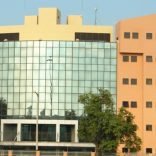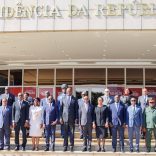Mozambique: Mondlane’s Anamola party registers over 64,000 members in ten days
Mozambique’s Nacala port is “crucial” for neighbouring countries – Nyusi

Photo: Presidente Filipe Nyusi/Facebook
President Filipe Nyusi on Saturday said that the Port of Nacala, in the north of the country, was “crucial” for the economies of landlocked neighbouring countries, and that Mozambique was fulfilling its strategic role in the development of the region.
President Nyusi was speaking during the inauguration of infrastructure at the Port of Nacala, in the province of Nampula.
“The Port of Nacala is crucial for the flow of exports, as well as for the import of cereals, fertilisers, fuels, medicines and equipment of various types, to meet the consumption needs” of Mozambique and neighbouring countries without direct access to the sea, the Mozambican head of state observed.
The rehabilitation, modernization and expansion of the Port of Nacala reflect the country’s commitment to consolidating its strategic role in the railway sector in Southern Africa, he added.
“This port asserts itself as a reference for the Mozambican economy and for the economies of the region and for Africa,” Nyusi stressed.
The head of state highlighted that the new cutting-edge technology, the high level of efficiency, the increased handling capacity and the deep waters make Nacala one of the “modern ports in Africa”.
Nyusi pointed to Malawi and Zambia as the countries with the greatest expectations about the new performance of the project, considering the dependence of the two countries’ international trade on such infrastructure.
The inauguration ceremony at the Port of Nacala was attended by the presidents of Malawi, Lazarus Chakwera, and Zambia, Hakainde Hichilema, and was marked by the signing of agreements between the governments of the three countries on the intensification of joint use of the Nacala Logistics Corridor, which includes the port.
As a result of the interventions, the port recorded an increase in its container handling capacity to more than 250,000 per year, compared to the previous 170,000.
The project cost more than US$273 million (€254.8 million) and was financed by the Japan International Cooperation Agency (JICA).












Leave a Reply
Be the First to Comment!
You must be logged in to post a comment.
You must be logged in to post a comment.